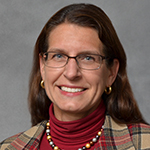Survival rates for the most common types of childhood cancer have greatly increased in recent years, but unfortunately, there has been little improvement in the prognosis for many less common and more aggressive tumor types. That’s why at CureSearch, we’re focused on the development of new, safe, effective treatments for the most difficult-to-treat pediatric cancers with the lowest survival rates.

We’re not just funding research. We’re funding impactful research. If a project isn’t on an accelerated path to new drug development, we don’t fund it.
The CureSearch Scientific Advisory Council (SAC), which includes best-in-class pediatric oncologists, sets the academic priorities for research initiatives and evaluates projects on scientific merit. Brenda Weigel, MD, of the University of Minnesota’s Masonic Cancer Center serves as the SAC chair and helps ensure that CureSearch’s funding and strategic initiatives are focused on the mission of the organization.
Dr. Weigel is the director of the Division of Pediatric Hematology/Oncology and is a professor cross-appointed at the University of Minnesota’s Masonic Cancer Center and the Department of Pediatrics. She conducted her residency in pediatrics at the University of Western Ontario. During her pediatric residency, she noticed the pediatric oncologists applied a scientific approach to patient care.
“In pediatric oncology, I found the perfect marriage of comprehensive medical care and cutting-edge research that truly could change lives,” she said.
Dr. Weigel’s research focuses on advancing new therapies that have a role in fighting cancer in children. She says one of the biggest challenges in developing those new therapies is the small number of patients available to study multiple possible treatment options. There is also a need for more research in pediatric tumor models to identify targets for therapy development.
“In order to advance the field of pediatric cancer drug development, the private and public sectors must work together,” said Dr. Weigel. “CureSearch is a unique organization that brings together all the key stakeholders including academia, industry, and regulatory experts, to set the priorities for funding.”
In doing so, CureSearch hosts collaborative events such as the Pediatric Early Development Symposium (PEDS). Dr. Weigel is the co-chair of the annual event that brings together industry, academia and regulatory leaders to examine the dynamic nature of clinical trials for children with cancer. This year’s symposium will explore global technological efforts to improve clinical trial design and implementation.
Dr. Weigel says that CureSearch is playing a leading role in sustaining a collaborative environment, as well as supporting impactful, next-generation research projects, all of which are necessary for real progress in the field.
“We are in a period of immense promise for the development of new cancer therapies for children, but with this promise arise inherent challenges,” she said. “Working together to gain a greater understanding of how to address these challenges and sharing information will allow us to develop, evolve, and implement strategies that not only meet regulatory requirements, but truly advance the care of children with cancer.”
To learn more about the SAC and its members, visit https://curesearch.org/advisory-councils.
